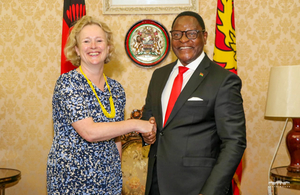PM opening remarks at press conference with German Chancellor Olaf Scholz: 8 April 2022
Joint press conference with Prime Minister Boris Johnson and German Chancellor Olaf Scholz
Good afternoon. It’s a pleasure to welcome you Olaf to Downing Street.
The friendship between our two countries has become even more vital since Putin launched his barbaric onslaught against Ukraine, bringing war to our continent.
I know that Britain and Germany share exactly the same sense of horror and revulsion at the brutality being unleashed, including the unconscionable bombing of refugees fleeing their homes this morning.
The attack at the train station in eastern Ukraine shows the depths to which Putin’s vaunted army has sunk – at least 39 people killed and dozens wounded on a train platform crowded with women and children.
Is it a war crime indiscriminately to attack civilians, and Russia’s crimes in Ukraine will not go unnoticed or unpunished.
Germany and the UK also share exactly the same conviction that Putin must fail in Ukraine.
Which is why we are working together in the G7 to toughen our sanctions, and target every pillar of the Russian economy, in order to cut off the funds from his war machine.
The UK and the EU have announced new sanctions this week, and just today we in the UK have imposed new asset freezes and travel bans.
We will also agree on the importance of weaning ourselves off dependence on Russian gas and oil, and ensuring that our energy security cannot be threatened by a rogue state.
This is not easy for any of us, and I applaud the seismic decisions taken by Olaf’s government to move Germany away from Russian hydrocarbons.
Today we have agreed to maximise the potential of the North Sea and collaborate on energy security and on renewables, where Germany and the UK lead the way in new technology.
We cannot transform our respective energy systems overnight, but we also know that Putin’s war will not end overnight.
That’s why Britain and Germany have joined dozens of allies to supply Ukraine with defensive weapons. Last week, the UK convened a donor conference which raised weapons and equipment for Ukraine worth over £1.5 billion – or 2.5 million items of military kit.
Today I can announce that the UK will send a further £100 million worth of high-grade military equipment to Ukraine’s armed forces, including more Starstreak anti-aircraft missiles, which fly at three times the speed of sound, another 800 anti-tank missiles, and precision munitions, capable of lingering in the sky until directed to their target.
We will also send more helmets, night vision and body armour, on top of the 200,000 pieces of non-lethal military equipment the UK has already dispatched.
But Olaf and I agree that our two countries and our allies must go further and provide more help to Ukraine. The Europe we knew just six weeks ago no longer exists: Putin’s invasion strikes at the very foundations of the security of our continent.
But his ambition to divide us has demonstrably failed; on the contrary, he has succeeded in uniting Europe and the whole trans-Atlantic alliance in support of Ukraine, and in strong solidarity with each other.
Putin has steeled our resolve, sharpened our focus, and he has forced Europe to begin to rearm to guarantee our shared security.
Britain and Germany will work together to ensure that our Armed Forces are fit for the future, including with our joint effort to manufacture state-of-the-art Boxer armoured vehicles.
We will hold a joint Cabinet meeting between our two Governments within the next year, our defence ministers will meet before the NATO summit in June, and I look forward to joining you Olaf at Schloss Elmau for the next G7 summit.
We face the new reality created by Putin’s invasion, I know that Britain and Germany will meet this challenge together, as passionate advocates of democracy and freedom, and both committed friends of Ukraine.
Thank you.

